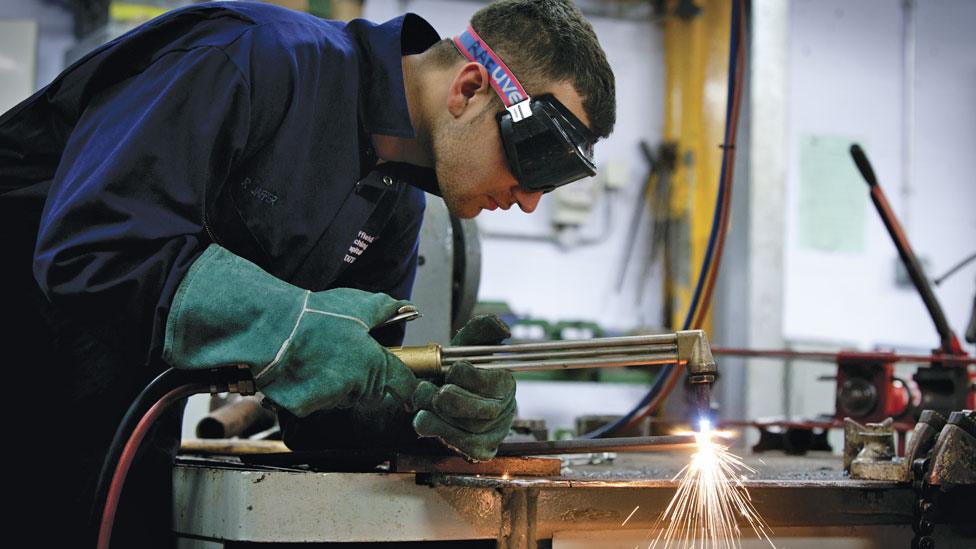'I regret not doing my apprenticeship sooner'
- Published

A report suggests 50% of apprenticeships since 2017 did not "relate to helping young people get started in a skilled job or occupation"
A scheme that can get you a globally-recognised qualification or a convenient way of employing cheap labour?
Apprenticeship courses have come under the spotlight following a report from an education think-thank.
The EDSK says half of the courses offered in England are "fake" and the scheme was "descending into farce".
But a Department for Education spokeswoman said the schemes are becoming "better quality".
An apprenticeship, external gives people the chance to work in a job that pays a salary, gives them hands-on experience and training opportunities.
Radio 1 Newsbeat spoke to two young apprentices who had very different experiences being on the scheme:
'I regret doing it so late'

Megan says she's been paid above the national living wage since she started the course two years ago
Megan, who is 24, started a degree in psychology and had a job in a high-street bank to earn money while she was at uni.
"All the while I was also keeping an eye on more job training because I wasn't enjoying juggling work and my degree," she explains.
She then saw an advert for an apprenticeship in banking and had a few interviews before getting started.
Megan says she's had "a really good experience" so far and will finish the course in the next few months.
To complete the scheme she has to pass an "end point assessment" - which aims to treat the people on the course as professional candidates and will see her demonstrating that she has the skills required to continue doing the job.
"We have skills coaches who are helping us through the whole apprenticeship journey.
"Also, the actual qualification we've done is recognised everywhere. It's not just something we'll be able to use within the company I already work for. It's recognised globally.
"If someone presented me with this opportunity at 17 I would have snatched at it, I sort of regret doing it so late.
"But at the same time, I'm just glad I found it."
'We weren't being taught anything'

Rachel left her apprenticeship because it "didn't line up to the job role I was doing"
The EDSK report claims that since 2017, £1.2bn from a fund designed to support apprenticeships has been spent on jobs "offering minimal training and low wages" or on "rebadging" jobs already offered by employers as apprenticeships.
Megan says she's been paid above the national living wage since she started the course two years ago.
But business apprentice Rachel says her scheme felt like her team "were just being used as cheap labour".
At first she was working with a team of seven to 10 people and had monthly meetings with people running the apprenticeships.
"Those meet-ups were more just asking those questions.
"We weren't being taught anything from the apprenticeship company, that went on for about eight months."
She says at this point her group of apprentices went down to four, including her, so the work load became much higher.
"We were basically doing the exact same role as our colleagues and they were getting about two grand more than us.
"There was a lot of pressure on the work we had to do as well... for the amount we were being paid it didn't add up and it felt a little bit like we were just being used as cheap labour."

It's claimed £1.2bn paid by big companies to fund apprenticeships has been spent on jobs "offering minimal training and low wages"
She's now managed to get a job in HR, with the company offering to pay for relevant courses to help her progress.
"It's a big step up for me, I'm excited to take on more responsibility.
"I think there are a lot of apprenticeships in certain industries that are actually really helpful for people getting into that job role.
"But I think some companies do take advantage."
A Department for Education spokeswoman defended the value of apprenticeships and said they had to meet "high-quality requirements".
She said they lasted "for a minimum of 12 months with at least 20% off-the-job training" and could not be called an apprenticeship unless it complied with such regulations.


Follow Newsbeat on Instagram, external, Facebook, external, Twitter, external and YouTube, external.
Listen to Newsbeat live at 12:45 and 17:45 weekdays - or listen back here.
- Published26 June 2019

- Published3 January 2020

- Published13 April 2018

- Published17 May 2019
